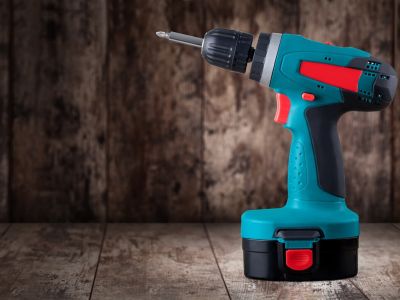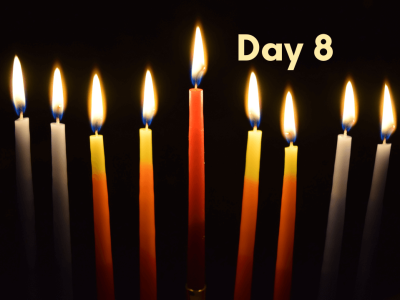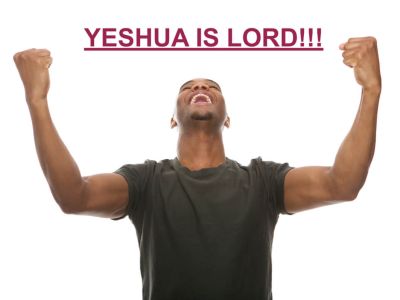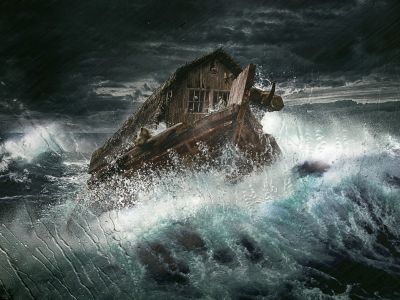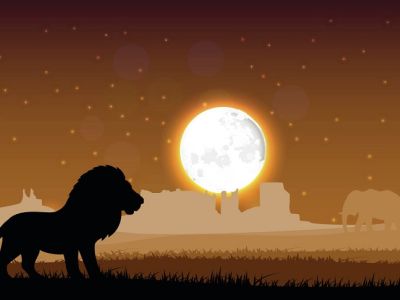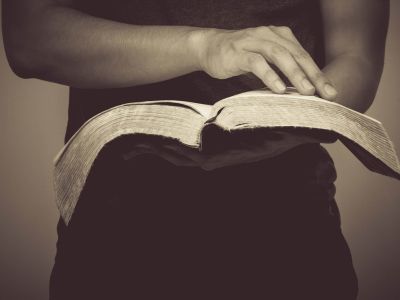Finders Keepers, Losers Weepers
Finders Keepers, Losers Weepers
We’ve all heard this saying many times over the years. As children we touted it to our siblings time and again. Unfortunately, as adults, it sometimes seems as though we still believe the adage because of the way we live our lives. In this short article we’re going to unravel that saying and find out just how true it is.

Leviticus 19:18
“..you shall love your neighbor as yourself: I am Yahweh.”
We’re all familiar with Yeshua’s quote when He gives the top two commandments in Mathew, but few understand that He was not making up a new commandment but was actually quoting the Torah as the final authority on the matter. From Genesis to Revelation, the Creator of the Universe wants us to love Him and love others. Every single commandment we run across will hang off of those top two. With that in mind, let’s take a look at a short passage from the Torah Portion Ki Tetze here in Deuteronomy.
Deuteronomy 22:1-4
Various Laws
“You shall not see your brother’s ox or his sheep going astray and ignore them. You shall take them back to your brother. And if he does not live near you and you do not know who he is, you shall bring it home to your house, and it shall stay with you until your brother seeks it. Then you shall restore it to him. And you shall do the same with his donkey or with his garment, or with any lost thing of your brother’s, which he loses and you find; you may not ignore it. You shall not see your brother’s donkey or his ox fallen down by the way and ignore them. You shall help him to lift them up again.”
Unfortunately, because many of us have been trained that the Torah has been done away with and the Old Testament is not to be used for doctrine anymore, we simply miss the power that God has put into each and every instruction. We are not trained to look for the original intent and so we only see an ox in a ditch or a lost donkey. We don’t see the higher Torah principle, the heart of God that is timeless for every generation. When we go past the black text into the heart of God, we find a tremendous application for this passage.
QUESTION: What is His original intent here? How would you apply this passage today?
The very first thing we can pull from this text is that there’s no such thing as an independent contractor in the Kingdom. The ancient Israelites were a farming community. Like my colleague Brad Scott always says, it’s about a house, a family and a piece of land. And he’s right. One’s entire life in those days could be reduced to those three components. It was a family community. Everyone helped everyone else because survival was the key. Today we really have no such concept.
When I grew up we knew our neighbors very well and hung out with them frequently for BBQs and get-togethers. Today, most people don’t even know their neighbors’ names and never even think about getting to know them. But when I was young, people looked out for each other because they wanted others to look out for them.
Let’s make this relevant for today. The text says that if you see your neighbor’s ox going astray you are supposed to take the animal back to its owner. If you don’t know whose it is, you are to take it home until the owner shows up looking for it. What if you saw your neighbor’s dog that got loose? Most would just keep on driving and ignore it because it wasn’t their problem. But according to scripture, we are to take the dog back to the owner or take it home and post a sign in the area letting people know that you found their pet.
Most people who find something of value will automatically pick it up and take it with them. “Finders keepers,” they say. But this is simply not what we’re supposed to do. We are not allowed to think like this. We are to look for the owner as best we can and make every effort to bring restoration. The next time you find something of value, ask yourself, “If I was the one who lost this, what would I want someone to do with it?” Then do just that.
Those compassionate few who would actually go the extra mile out of love for their neighbor are certainly doing a good deed. But let’s go a little further. What if you were part of a fellowship and you saw one of your friend’s kids doing something you knew their parents would not approve of? What would you do? Remember that the scriptures say that if you “see your brother’s ox or his sheep going astray…” So what do you do when you see a “sheep” going astray? Do you look away and make a comment to your spouse about how terrible so-and-so’s kids are? Or do you do the uncomfortable thing and approach the parent in love and share with them what you saw? Every good, godly parent wants to know when their child is acting up or “walking in the wrong direction.” It’s our job to correct them in those times so that they don’t end up going astray. Unfortunately, far too many times people just look the other way and gossip about the child or the parents. This defrauds the young person of proper instruction and, according to scripture, you could be liable on Judgment Day for not saying anything.
Ezekiel 3:18
“When I say to the wicked, ‘You shall surely die, ‘ and you give him no warning, nor speak to warn the wicked from his wicked way, to save his life, that same wicked man shall die in his iniquity. But his blood I will require at your hand. Yet if yo warn the wicked, and he does not turn from his wickedness, nor from his wicked way, he shall die in his iniquity. But you have delivered your soul.”
James 4:17
“Therefore, to him who knows to do good and does not do it, to him it is sin.”
Although the above scriptures are a bit more complex than they appear, the point is obvious. When it is within our power to do it and the Lord leads us, we are to do good and warn others of what we see. Once our hearts are aligned with the commandment, the Spirit can lead us to exactly what we’re supposed to do and when. This doesn’t make us the sin police but it does make us more aware and sensitive to ask the Spirit what He would have us do to “do good.”
You might ask yourself, “Am I my brother’s keeper?” But before you do, you might want to find out who became famous for inventing that phrase.
After Cain killed Abel, Yahweh asked Cain where Abel was. Abel responded with, “I do not know. Am I my brother’s keeper?” (Genesis 4:9)
Abel’s comment was made from a heart with no concern for his brother and it was in the context of extreme sin. The truth is that we ARE our brother’s keeper and our brother is ours. We are supposed to help each other out and lift each other out of the mire. We are to reach out our hands and pick each other up. As a matter of fact, this passage goes on to say that if you see your neighbor’s animal has fallen down on the road, you’re supposed to help the animal get back up again. If we are to help our neighbor’s animals out when they fall, how much more should we help our neighbor out when HE falls?
Everyone falls every now and then. They might lose their job, have a marriage problem, or might even fall into sin. According to this scripture, we are NEVER to hide from our brother. We are to do just the opposite. We are to extend our hand and reach out with the love of Christ. What do we tend to do when we discover someone has sinned or is struggling in their walk with God and we see them in the store somewhere? We HIDE! We immediately back up our shopping cart into aisle five and hide behind the soup cans until they pass. Why? Because we don’t love our neighbor. We’re uncomfortable around them. It’s awkward to even see them because we don’t know what to say, right? The reality is that we don’t really love people. You might think I’m being a bit too harsh. But am I? Because the way I read my bible is that when people are stuck in a ditch or make mistakes, that’s when who we really are actually comes out. That’s when we’re supposed to actually BE YESHUA the most, isn’t it? Did Christ come for the sick or the healthy? For the righteous or the sinner? Did He love on the tax collector or the priest? What if He would have decided to turn his back on us 2000 years ago instead of getting down and dirty and going the extra mile dragging OUR cross all the way up that hill with Him?
Let me illustrate how far we’ve fallen from actually following the Torah on this level. When you think of a prostitute, what kind of feelings or thoughts come up? Disgust? It’s sin? An abomination? Those are not the thoughts our Lord and Savior thought. His thoughts were ones of compassion and great sorrow. He might have thought to Himself, “It breaks my heart to see that young woman doing that. I wonder what terrible thing happened in her life that set her on that path? I wonder if she was molested by a family member or raped as a young girl? I wonder if she’s homeless and feels there’s no other way to make money to eat? Or worse yet, maybe she was forced at an early age by very evil men to do such things and has been threatened that if she even thinks of leaving, she will be killed.” I believe that at that moment Yeshua would have prayed for her. This, my friends, is separating the sin from the sinner. Religion judges and condemns people that have fallen on the road and are in the ditch. Love reaches out a hand to help them back up. The religious hide from their neighbor. Those filled with the love of God understand that “we all have sinned and have fallen short of the glory of God” (Romans 3:23) and that “the wages of sin is death” for all of us (Romans 6:23). There are no stones to throw for those who understand the power of the Torah in the life of every believer. The written Torah may be forced to point out sin, but the LIVING Torah that was made flesh, the One we’re supposed to emulate, points the way out! And He needs real people to do it.
My friends, this is how we “love our neighbor as ourselves.” We reach out our hand when someone has lost their way. We go the extra mile when we see an opportunity to love instead of judge. When someone is cranky and says something mean, this passage says that that person has just fallen on the road and needs a bit of help. Instead of letting them get to you, why not try to get them to smile? Why not say to them, “I can see that you’re having a rough day. I’ve been there, man. Is there anything I can pray about for you?” If hurt people hurt people, why not defer to the possibility that if they’re hurting you, it’s because they’ve probably been hurt themselves?
This excerpt may only be four verses, but it has four hundred applications that all come down to love. If you claim to be a child of the Book, then let’s start acting like it. Make a commitment to the Father today to stop hiding and judging those who’ve gone astray and start to reach out your own nail-scarred hand. Love them out of the ditch and back onto the road to the King. If Yeshua left His throne and lowered Himself to become the Living Torah for us, should we not get off our own thrones and meet people where THEY are and become a Living Torah for them? Loving people does not take away the fact that there are consequences for sin. And we all reap what we sow. And sometimes those consequences are pretty tough to take (or to watch someone take). But it does mean that we go out of our way to help people get back on the road and leave the judging to the religious Pharisees.
Shalom,
Jim Staley




